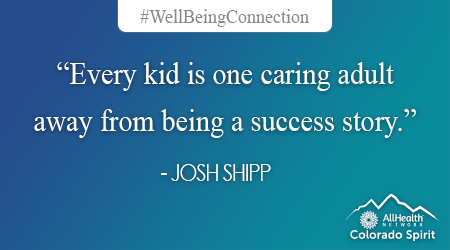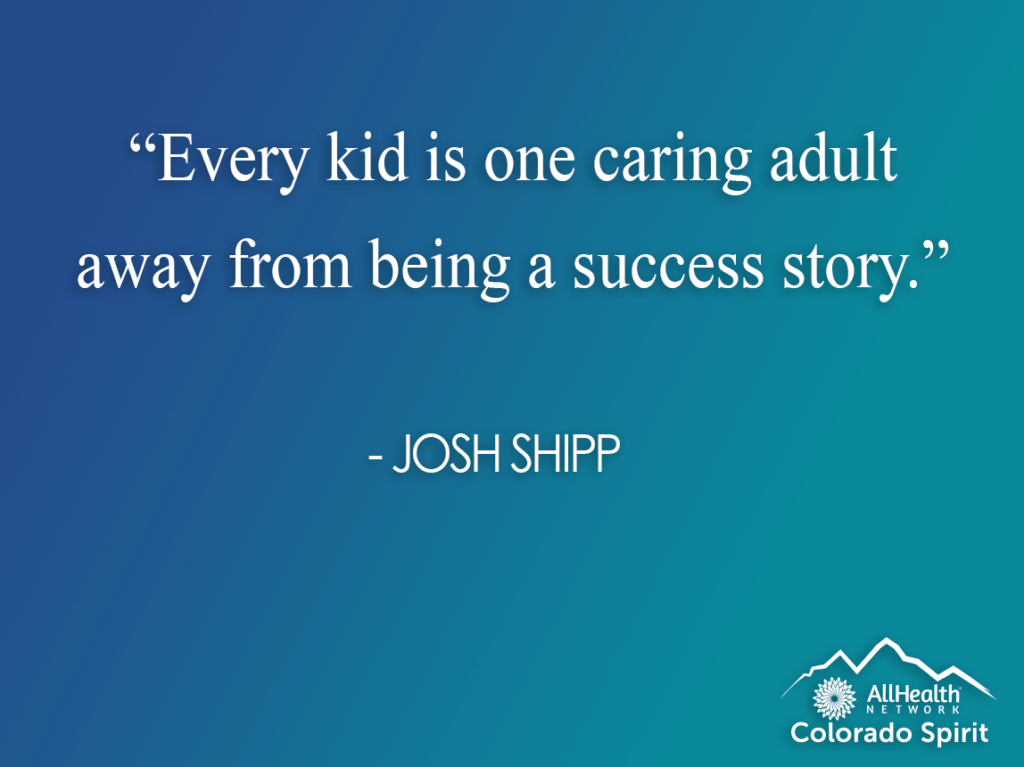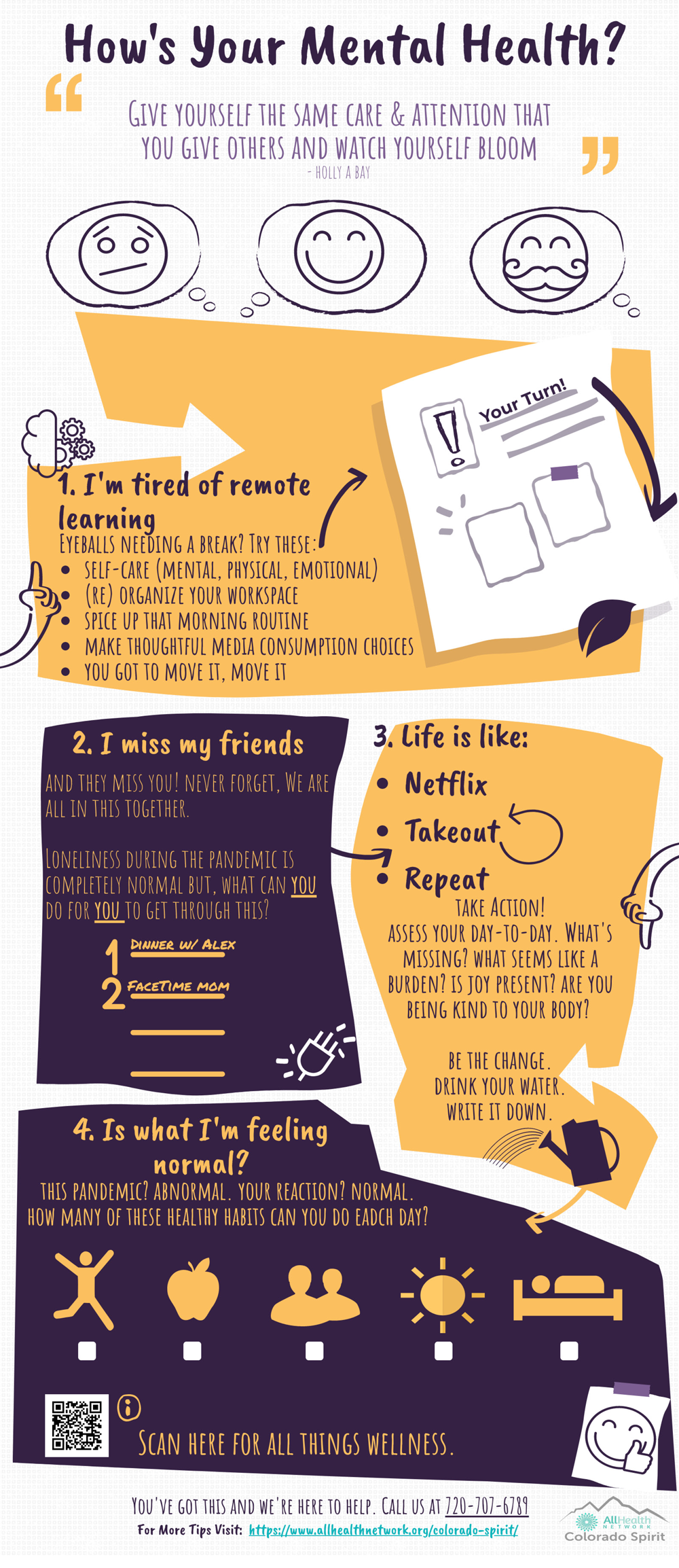Welcome to the Weekly Well-Being Connection! Each week we will share advice from our clinical experts on ways to care for your mental health and well-being throughout COVID-19.
Here in Arapahoe and Douglas County most of our schools are transitioning kids back to more in person learning. “First Day Back at School” pictures on social media indicate excitement about returning to in-person learning. For many kids, being back in the classroom feels more “normal,” and some children are experiencing difficulties with yet another transition. While it is important to celebrate and acknowledge this shift, I also want to create space for conversations about how this shift might feel difficult for some of our kiddos (and for some of us parents and school staff). After a year of engaging in school in a very different way (e.g., hybrid schedules and remote learning), many of us have developed a routine and groove. Some of our youth have thrived at home. This change in routine can cause anxiety and worry for some youth.
In honor of possible mixed feelings about changes in school routines, we wanted to offer some tips and considerations for supporting youth in the transitions they might be facing.
- Responses to returning to school will be varied, and that is ok! There is no one way youth “should” feel or act. As adults, when we normalize feelings and label mixed emotions about changes (for example, I can be both really excited and really nervous), we support our youth!
- Many kids will take their cues from the adults in their worlds. If adults feel good about them returning to school, kids tend to feel more confident and comfortable. While we don’t encourage “faking” enthusiasm, we want to provide a gentle reminder that as adults we are sending messages to our kids through what we say and how we act.

- Keep connecting with your kids. These four questions are great open-ended conversation starters. Also, if your kids are not in a talkative stage, create space to do things with them (e.g., cooking a meal, walking the dog, creating art, playing a game). Sometimes the act of engaging in an activity helps kids open up a little more as it can feel like there is less pressure than in a more traditional conversation.
- Validate what kids are feeling. Even though we may not see our kid’s fears playing out as they imagine and worry about them, the concern they feel is real. If we can find ways to acknowledge this while still expressing our confidence in their ability to navigate this transition, we are doing them a service.
- Sometimes kids won’t tell us how they are feeling. Be on the lookout for different behavior changes that might indicate some stress. For example, changes in sleep habits, stomach aches and headaches, withdrawing from friends and family, or seeking more reassurance than typical are all ways we might get clues that our kids have concerns.
- For tweens and teens especially, balance their need for privacy with routine check-ins. It is completely developmentally appropriate for our older kids to pull away from family some. At the same time, communicating that we are there for them and will keep checking in and talking to them is important.
- Sometimes our kids hesitate to tell us they are struggling because they don’t want to disappoint us or add to our worries. The more we can do to make it ok to talk about difficult things or things that we are struggling with, the more we are modeling to our kids that it is ok to have struggles and that we are there for them regardless.
- Keep practicing solid coping skills – both you and your kids. Kids will always benefit from things that help them manage stress and big emotions. As parents, we are dealing with a lot too, so the more we can tap into our solid coping skills, the more we will be able to support our youth.
Share resources with your kids, especially your teens and tweens. The Colorado Spirit Team at AllHealth Network created this infographic to support teens and college students. There are also tons of apps that teens might find interesting. This article identifies a few apps that might be particularly helpful for stress and anxiety.
Would speaking to someone help?
To speak with someone in the Colorado Spirit Program about stress related to the pandemic, please call 720-707-6789 or visit our web page at www.allhealthnetwork.org/Colorado-Spirit
For information about other services at AllHealth Network or to get connected with ongoing behavioral health support, please call: 303-730-8858.
AllHealth Network is continuing to provide service via telehealth or by phone and our Crisis Walk-in Center remains open 24/7. To learn more about what other community mental health centers are doing, please visit The Colorado Behavioral Health Council COVID-19 website.
If you are experiencing a mental health crisis and are in need of immediate assistance, please call the Colorado Crisis Hotline at 1-844-493-TALK (8255) or text TALK to 38255.



